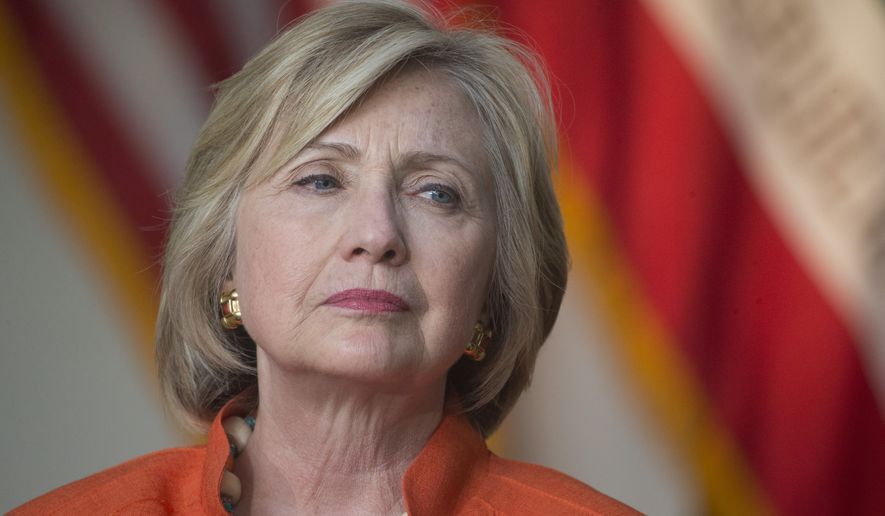Former Secretary of State Hillary Rodham Clinton’s favorability ratings among Americans are approaching historically bad levels while some of her potential 2016 GOP rivals have boosted their appeal among Republicans and with the general public over the past few months.
Fewer than 50 percent of Americans said they have a favorable opinion of Mrs. Clinton in recent Gallup and ABC/Washington Post polls. Her 41 percent favorable rating in the Gallup survey was close to her lowest in more than two decades of Gallup polling, and her 53 percent unfavorable rating in the ABC/Post poll was one point off the highest mark in more than two decades in those surveys.
“There’s been a slow drip,” said Tim Malloy, assistant director of the Quinnipiac University poll. “She’s slowly, gradually losing points on favorability, honesty, and trustworthiness.”
Mrs. Clinton, the Democratic presidential front-runner, has been dogged by questions over her decision to set up a private email account and server as secretary of state instead of using a standard government account. She said in a recent interview with MSNBC that it “wasn’t the best choice” and that she’s sorry the situation has been confusing.
In a recent Quinnipiac poll, “liar” was the first word that came to mind when voters were asked an open-ended question about Mrs. Clinton; overall, she had a 39 percent/51 percent favorable/unfavorable split. That was down from a slightly negative 45 percent/47 percent in a Quinnipiac survey released in late May and a positive 48 percent/45 percent split from one released in March.
She still had a 76 percent favorable rating among Democrats in the most recent survey, but that was down from 85 percent in May.
Mrs. Clinton’s struggles have opened the door for Sen. Bernard Sanders of Vermont, who has gained on her in some recent polls in the early states of Iowa and New Hampshire.
Mr. Sanders actually led Mrs. Clinton by 9 points, 41 percent to 32 percent, in New Hampshire, according to an NBC News/Marist poll released Sunday, with Vice President Joseph R. Biden Jr. at 16 percent.
Mrs. Clinton had a 11-point lead over Mr. Sanders in Iowa, 38 percent to 27 percent, with Mr. Biden, who had not yet declared his 2016 intentions, at 20 percent, according to another NBC News/Marist survey released Sunday. In July, Mrs. Clinton had a 24-point lead on Mr. Sanders, 49 percent to 25 percent.
Mr. Sanders’ rise has come even as he remains largely unknown to many voters across the country. He had a 32 percent/28 percent favorable/unfavorable split overall and a 54 percent/8 percent split among Democrats in the Quinnipiac survey released last month.
In the Quinnipiac survey released in late May, meanwhile, six-in-10 Democrats and six-in-10 voters overall who were asked said they hadn’t heard enough about him to form an opinion.
On the Republican side, billionaire businessman Donald Trump has maintained his front-runner status, but retired neurosurgeon Ben Carson’s stock has been on the rise: Mr. Carson has been rated the best-liked Republican candidate among GOP voters in recent polls.
Mr. Carson had a 67 percent/6 percent favorable/unfavorable split among Republicans in a recent Monmouth University poll — a huge move from a 39 percent/16 percent split in a poll released in April.
Mr. Carson “has obviously moved up and he has good favorability,” Mr. Malloy said. “So does [Florida Sen. Marco] Rubio.”
Indeed, Mr. Carson and Mr. Rubio actually ranked first and second, respectively, in net favorability among registered voters overall in a recent Quinnipiac survey. Among Republicans only, Mr. Rubio had a 72 percent/3 percent split and Mr. Carson a 62 percent/6 percent split, steadily increasing their favorable numbers over the past few months as more voters formed an opinion of them.
Republicans also have warmed to Mr. Trump, who had a 20 percent/55 percent favorable/unfavorable split in a Monmouth survey in June that has turned around to a 59 percent/29 percent split in the most recent survey.
Two Republicans who have slipped in recent polling — former Florida Gov. Jeb Bush and Wisconsin Gov. Scott Walker — appear to be treading water on favorability within their own party as others move up.
Mr. Bush had a 40 percent/35 percent split among Republicans in a June Monmouth poll and a 41 percent/39 percent split in the survey released last week.
Mr. Walker, meanwhile, still had a very strong 42 percent/15 percent split among Republicans in the latest Monmouth poll, akin to his 42 percent/12 percent split in June.
• David Sherfinski can be reached at dsherfinski@washingtontimes.com.




Please read our comment policy before commenting.